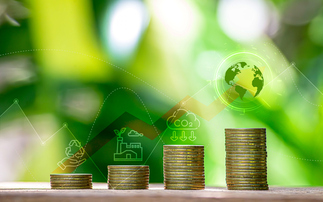There are two ways to respond to the news that the world is miles from meeting its greenhouse gas emissions targets. You can feel depressed and hopeless, which is how most headline writers seem. The BBC's "'Bleak' outlook as carbon emissions gap grows " sums up the Eeyorish tone.
Or, you can recognise that the climate crisis demands a forceful, positive response. Negativity isn't getting us anywhere. In the aftermath of the 25th COP summit, the annual meeting where national emissions targets are discussed, here are three reasons for investors to think (and act) positively.
1) The focus is shifting to positive investment
As the director of the United Nations Environment Programme, the agency that compiles the Emissions Gap Report, says: "We need to catch up on the years in which we procrastinated." ‘Catching up' means a massive and immediate acceleration of efforts to tackle climate change, because the 1.5C goal will be out of reach before 2030. Negative actions alone - cutting back consumption or, from an investment perspective, divesting from fossil fuels - won't get us anywhere close.
This shift in emphasis towards positive investment is good for the planet, because it raises the likelihood of meaningful action being taken. It's also good for investors in decarbonisation, because it will strengthen the tailwind behind the businesses that are shifting the global economy to a lower-carbon model.
Specifically, we need to invest positively in: transforming our energy infrastructure; electrifying transport and other systems; and vastly improving energy efficiency. There are investment opportunities across all three of these pathways to a lower-carbon economy. We wrote about the broad and varied universe of businesses involved here.
2) The risk of positive shocks may be rising
Of course, the world is already investing to tackle climate change. We're currently spending about one-quarter of the US$2.4 trillion required each year to stop temperatures rising dangerously. But even this is driving a powerful secular growth trend for select companies. The additional spending required to achieve global emissions targets would put that growth into hyperdrive.
It remains to be seen whether the full investment will be made. But the UN's latest dire assessment increases the likelihood of regulatory, technological or consumer-choice shocks to get emissions on track. (We talked briefly about the ‘inevitable policy response' here.) Such shocks would be positive for decarbonisation companies and negative for businesses with high climate-risk exposure.
To illustrate the growth potential of decarbonisation businesses, cutting emissions sufficiently to achieve the 1.5C goal would mean increasing wind and solar's share of the energy mix from 7% to 70%. The proportion of electric cars on the road would need to reach 100%. That isn't our base case, but we discussed why 2020 could be the year of the electric car here.
As an aside, upside shocks would only be felt meaningfully in listed equities, which immediately price in changes in expected growth. Green bonds and private infrastructure - other ways that investors might seek exposure to decarbonisation - won't respond in anything like the same manner, largely because their returns are contracted, which makes their valuations fairly stable. In other words, we think these asset classes offer neither the upside possibilities of listed equities, nor equities' potential to hedge against transition risk.
3) Positive political and business momentum
Finally, we'll offer a personal perspective on why we think investors should be positive: we have never seen such an intense focus on climate change. The global alarm at the UN's emissions update tells you how far this issue has risen up the agenda.
We're seeing political responses that would have been unthinkable a few years ago. European industrial policy is now based entirely around the low-carbon economy, and the bloc may soon vote on a law that would halve emissions by 2030. In the US, some presidential candidates are proposing green agendas that would make European climate policy look retrograde. And the need for climate action is about the only thing the major parties contesting the UK general election agree on.
The response from sections of the business community offers even more cause for optimism. There are some great decarbonisation enterprises with solid business models, impressive technologies and defensible competitive positions. There are also companies that don't have these attributes - which is why we advocate a research-intensive, highly selective approach, because the winners of decarbonisation will be the companies that can generate sustainable returns from this structural growth trend. But with the right methodology, we think it's possible to build a portfolio of durable businesses that are key enablers of decarbonisation. What's more, investing in these companies will have a positive impact by aiding the transition to a lower-carbon economy.
Let's close with one more positive for investors. The consensus is forecasting lower growth for our proprietary universe of decarbonisation companies than for the market overall. To us, that makes no . But it also suggests opportunities to invest in businesses whose potential the market is yet to recognise. If that doesn't sound like a reason to look forward more positively, we're not sure what would.
All investments carry the risk of capital loss.









